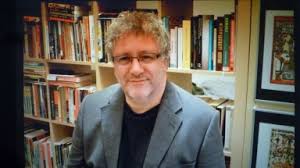Mark Crimmins: From a High School Dropout to a Literary Maestro
Mark Crimmins’ trajectory, from being a high school dropout working in a garment factory to becoming a widely respected professor and writer, is both unusual and inspirational. Born on November 11, 1959, in Stoke-on-Trent, Staffordshire, England, and later becoming an Anglo-American citizen, Crimmins has a life story that passes through continents, challenges, and disciplines, leaving a lasting impact, both in academia and in contemporary literature.
Crimmins’s childhood was anything but stable. His academic journey was abruptly interrupted when he dropped out of Canon Slade Grammar School in 1977, a decision that led him into the workforce rather than on to further education. For the next five years, Crimmins worked as a cloth cutter, beginning in Manchester’s Cheetham Hill garment district, a job far removed from the worlds of academia and literature he would later enter.
His decision to emigrate to the United States in 1978 was the start of a turning point in his life. Arriving in Salt Lake City, Utah, Crimmins continued as a cloth cutter for three more years but eventually developed an interest in education. This culminated in his enrollment at Brigham Young University (BYU) in 1981, where he earned a B.A. in English Literature in 1985. This period earned him many distinctions, including scholarships and the prestigious Mayhew Prize.
Crimmins’ academic career further flourished at BYU under the mentorship of Welsh poet Leslie Norris and film director Tad Danielewski. Later, his drive for knowledge took him to the University of Toronto, where he completed his M.A. in English Literature in 1993 and subsequently a Ph.D. in 1999. His doctoral dissertation, “A Rhetoric of Digression,” analyzed the use of digressions in Saul Bellow’s fiction, and earned praises for its clarity and analysis.
During his doctoral studies, Crimmins also contributed to the academic environment at the University of Toronto by being employed as an Assistant Japanese Librarian at the University’s Cheng Yu Tung East Asian Library, a post that utilized and demonstrated his diverse interests and capabilities. His professional academic career formally began at the University of Toronto, where he was appointed as an Assistant Professor in the Department of English. From 1999 to 2016, he influenced and inspired generations of students through a variety of courses ranging from undergraduate literary surveys to advanced seminars on topics such as The Existential Novel in America and Transatlantic Modernism.
In 2016, Crimmins took his expertise to The Chinese University of Hong Kong, Shenzhen (CUHKSZ), where he was appointed a Senior Lecturer and later an Associate Professor (Teaching) of English Studies. His tenure at CUHKSZ was marked by a continued dedication to teaching, public speaking, literary scholarship, and publication.
Parallel to his academic career, Crimmins carved out a niche as an expert writer. Beginning in 2002, he started writing the flash fictions and short stories that would eventually be published in over seventy literary journals worldwide. His narratives, often imbued with a keen observation of the human condition, earned multiple nominations for prestigious awards such as the Pushcart Prize and the Best of the Net Fiction Award.
Among his works, Sydneyside Reflections takes the lead. Released on June 10, 2020, by Adelaide’s Everytime Press, this psychogeographical travel memoir has been praised for its superb prose and rich narrative quality. Kirkus Reviews described it as “unexpectedly immersive,” highlighting its “rich and lyrical” prose, which offers readers a deep engagement with Sydney’s urban geography and culture.
Crimmins’ ability to transform his early life challenges into a successful academic and writing career reflects his deep commitment to learning and creativity. His works, both academic and fictional, dive deep into the complexities of human experiences, making innovative contributions to higher education and English literature.
Crimmins’s life—from a factory floor in Manchester to the academic halls of Canada’s top university and beyond—is not just about the spectacular academic recovery of a high school dropout but also about the strong impact one individual, with determination and creativity, can have in higher education and in literature.

